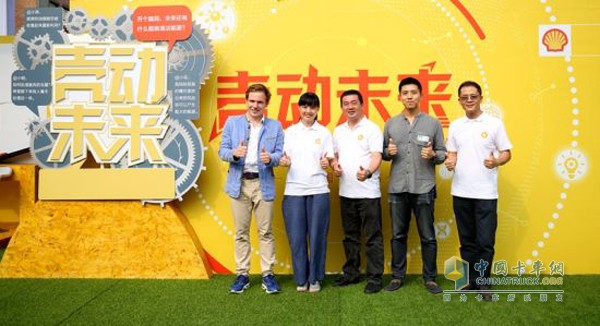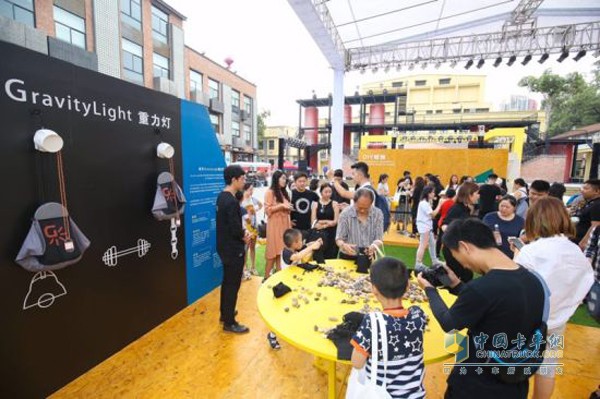This event takes the opportunity of Shell's cooperation with six smart energy start-ups worldwide, through the interactive display and experience of the “Smart Energy Creative Carnivalâ€, to share these energy maker innovative energy solutions with the Chinese public and support them. Innovation and cooperation to the "shell" move the future. Since entering the Chinese market in 1894, Shell has always used more and cleaner energy solutions to fuel China’s social development and people’s lives, helping cities, communities and individuals in different historical periods to realize their dreams. Over the past two years, Shell China has organized a number of community events in Weifang, Xi’an, Foshan and Chengdu. By combining local humanities characteristics, it called on local residents to join Shell to focus on energy innovation and fuel their dreams. This year's “shell†dynamic global brand activity is a fusion of energy innovation concepts from different regions of the world. With broader and deeper cooperation, it will open an “energy relay†on five continents. At the event, four energy companies supported by the “Shell†Global Project are demonstrating their innovative technology applications – China’s local startup, Motion ECO, is able to turn waste oil into a biofuel “magic†GravityLight gravity lights converted to electricity for lighting, Pavegen power bricks that convert the kinetic energy of the footsteps into electricity, and bio-beans that convert coffee grounds into everyday energy. At the same time, interactive bicycles, handmade candles DIY and other projects also have interactive booths at the scene. Visitors at the site will experience “how to set up a recycling center†at these innovative energy booths to experience how energy makers can recycle energy through technological innovation. Liu Shutong, the founder of MotionECO's Dolan Circle Energy, also came to the event to share his energy ideas with the public using a TED-style speech “Let the oil flyâ€. The scene also set up the Shell China History and Smart Energy Exhibition with the theme of "shell" moving the future, showing the many "firsts" of China's energy industry that Shell set up with partners in the course of deepening the Chinese market for 123 years. The story of fueling the dreams of Chinese cities, communities and individuals. As a representative of the smart energy maker, Liu Shutong said: "Thanks to the support of the 'shell' brand for future global projects, we can better realize and promote entrepreneurial dreams - 'ditch oil' that endangers food safety. , convert to low-polluting biofuels, and achieve cleaner, recyclable energy consumption patterns." It is reported that this event is also the third consecutive year that Shell China has brought brand new events to Chengdu. With the “shell†to move forward with the global project, Shell will continue to call for more communities, organizations, the public, and celebrities to join in the search for smart energy and the “shell†dream of a bright future.
Angular contact Ball Bearings
Angular Contact Ball Bearing has high
limit rotational speed, they can carry radial load and axial load
simultaneously, they can also withstand purely radial load. The axial load
carrying capacity depends on the magnitude of contact angle and increases with
increasing contact angle.
Structures
1.
Non-separable
angular contact ball bearings
This inner ring and outer ring of this
type of bearings cannot be separated and comprises following structures:
Contact
angle α=15° counter bore on outer
ring,7000Ctype
Contact
angle α=25° counter bore on outer
ring,7000ACtype
Contact
angle α=40° counter bore on outer
ring, 7000B type
2. Four-point
contact ball bearings
This type of bearings is separable
bearings. Whereof, QJ0000 type has two-piece inner ring and QJF0000 type has
two-piece outer ring. Their contact angles are same as 35°.When received no
load or pure radial load, the steel balls of the Ball Bearing contact with the
four points of the rings. When it is received a pure axial load, the steel
balls perform a two-point contact with the ring. In addition, besides the axial
load from both directions, this kind of bearing can take torque-load as well.
3.
Double
row angular contact ball bearings
This kind of bearings can accommodate
radial loads as well as axial loads acting in both directions; they can also
take loading moment. They can restrain the axial displacement from both
directions of the shaft or housing; the contact angle is 30° (or 40°)
Permissible tilt angle
There is only a little inclination
between the inner ring and outer ring of angular contact bearings, the
permissible tilt angle varies according to the internal clearance when the
bearings are operating, the bearing dimensions, internal design, force and loading
moment received by the bearings. The value of the maximum permissible tilt
angle should be able to ensure that no much extra stress to be generated inside
the bearings.
The tilt angle existing between the
inner ring and outer ring will influence the bearing service life. Meanwhile,
the running accuracy is decreased down and noise increased.
Tolerance and clearance
The tolerances of general angular
contact bearings are class normal P0, class P5 and P6. Class P4 and P2 are applicable
to machine tool spindles and bearing amount in pairs.
Clearance
of single row angular contact bearing is decided by the contact angle, which is
guaranteed by manufacturing.
Axial clearance of Four-point contact ball bearings is listed in
table 1.
Cage material
Generally, the cage of angular contact
bearing is pressed cage of steel sheet or brass cage, and it is solid brass
cage for two row angular contact bearing.
Dynamic equivalent radial
load
Single-row
angular contact ball bearings with a contact angle of 15°
Single
bearing or bearing in pairs(7000
C.7000
C/DT)
Fa/Fr≤e Pr=Fr
Fa/Fr>e Pr=0.44Fr+YFa
Back-to-back
and face to face arrangements(7000
C/DB.7000 C/DF)
Fa/Fr≤e Pr=Fr+Y1Fa
Fa/Fr>e Pr=0.72Fr+Y2Fa
Single-row
angler contact ball bearings with a contact angle of 25°
Single
bearing or bearing in pairs(7000
AC.7000
AC/DT)
Fa/Fr≤0.68 Pr=Fr
Fa/Fr>0.68 Pr=0.41Fr+0.87Fa
Back-to-back
and face to face arrangements(7000
AC/DB.7000 AC/DF)
Fa/Fr≤0.68 Pr=Fr+0.92Fa
Fa/Fr>0.68 Pr=0.67Fr+1.41Fa
Single-row
angular contact ball bearings with a contact angle of 40°
Single
bearing or bearing in pairs (7000 B.7000
B/DT)
Fa/Fr≤1.14 Pr=Fr
Fa/Fr>1.14 Pr=0.35Fr+0.57Fa
Back-to-back
and face to face arrangements(7000 B/DB.7000
B/DF)
Fa/Fr≤1.14 Pr=Fr+0.55Fa
Fa/Fr>1.14 Pr=0.57Fr+0.93Fa
Four
point contact ball bearings with a contact angle of 35°
Fa/Fr≤0.95 Pr=Fr+0.66Fa
Fa/Fr>0.95 Pr=0.6Fr+1.07Fa
Double-row
angular contact ball bearings with a contact angle of 45°
Fa/Fr≤1.34 Pr=Fr+0.47Fa
Fa/Fr>1.34 Pr=0.54Fr+0.81Fa
Static equivalent radial
load
Single-row
angular contact ball bearings with a contact angle of 15°
For
single bearing or bearing in pairs(7000 C.7000 C/DT)
P0r=0.5Fr+0.46Fa
P0r<Fr P0r=Fr
For
back-to-back and face-to-face arrangements (7000 C/DB.7000 C/DF)
P0r=Fr+0.92Fa
Single-row
angular contact ball bearings with contact angle of 25°
For
single bearing or bearing in pairs (7000 AC.7000 AC/DT)
P0r=0.5Fr+0.38Fa
when
P0r<Fr let P0r=Fr
For
two bearings in back-to-back and face-to-face arrangements
P0r=Fr+0.76Fa
Single-row
angular contact ball bearings with contact angle of 40°
For
single bearing or bearing in pairs
P0r=0.5Fr+0.26Fa
when
P0r<Fr let P0r=Fr
For
two bearings in back-to-back and face-to-face arrangements
P0r=Fr+0.52Fa
Four
point contact ball bearings
P0r=Fr+0.58Fa
Double-row
angular contact ball bearings with contact angle of 45°
P0r=Fr+0.44Fa
Fr Actual radial load of the bearing.
Fa Axial load of the bearing
The
values of e .Y .Y1 .Y2 see Table
2.
Table 1 Axial internal clearance of four point
contact ball bearings
μm
Nominal bore diameter d
mm
C2
clearance
Standard
clearance
C3
clearance
C4
clearance
Over
To
Min
Max
Min
Max
Over
To
Min
Max
10
18
40
60
80
100
140
180
220
260
18
40
60
80
100
140
180
200
260
300
15
26
36
46
56
66
76
96
115
135
55
66
86
96
116
136
156
176
195
215
45
56
76
86
96
116
136
156
175
195
85
106
126
136
156
176
196
216
235
275
75
96
116
126
135
156
176
196
215
255
115
146
166
176
196
216
236
256
295
335
105
136
156
166
176
196
216
236
275
295
145
186
206
216
236
256
276
296
335
355
Table 2 Calculate
Coefficient
μm
e
Y
Y1
Y2
0.172
0.345
0.689
1.03
1.38
2.07
3.45
5.17
6.89
0.38
0.4
0.43
0.46
0.47
0.5
0.55
0.56
0.56
1.47
1.4
1.3
1.23
1.19
1.12
1.02
1
1
1.65
1.57
1.46
1.38
1.34
1.26
1.14
1.12
1.12
2.39
2.28
2.11
2
1.93
1.82
1.66
1.63
1.63
Dw
is the diameter of the rolling element
Angular Contact Ball Bearing Machined Cage Angular Contact Ball Bearing,Pressed Cage Angular Contact Ball Bearing,One Row Angular Contact Ball Bearing,Two Row Angular Contact Ball Bearing Xibei Bearing Co.,Ltd. , https://www.nxzjck.com Event launch site
Event launch site  Interactive Experience
Interactive Experience
On June 11, 2017, Shell 's global brand activity in 2017 called “Shell†will start in Chengdu in the future.